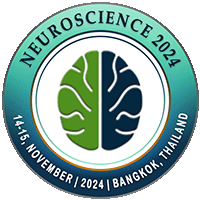
Ivan Voloshyn-Haponov
V. N. Karazin Kharkiv National University, UkraineTitle: Application of transcranial magnetic stimulation in the rehabilitation of Ukrainian patients with multiple sclerosis
Abstract
Objective. To evaluate the safety and the possibility of adverse effects of transcranial magnetic stimulation (TMS) during and after the session in patients with multiple sclerosis (MS). In recent years, new techniques have emerged that can improve patient recovery and enhance the arsenal of methods available in neurorehabilitation (exercise therapy, kinesiotherapy, physiotherapy). The latter methods include transcranial magnetic stimulation (TMS). A feature of the TMS method is its non-invasiveness, safety and ease of use. All these qualities and the possibility of differentiated application allow TMS to be used in a rehabilitation clinic and become an essential component of active medical and non-medical rehabilitation of MS patients.
Method. Transcranial magnetic stimulation (MagVenture, MagPro X100, and 8-shaped inductor (coil)).
Results. Forty-six patients with multiple sclerosis with a remitting type of course were treated. The results of the treatment showed that: TMS reduces, to some extent, the severity of the main neurological symptoms of MS. The overall EDSS score in the experimental group significantly improved during treatment: from 5.0±1.9 to 4.5 ± 2.0 points (p<0.01). TMS had a positive effect on the reduction of cognitive rigidity and difficulties in rethinking and changing activities, which manifested itself in improved performance of the Stroop test, p<0.05. TMS has a positive effect on the psycho-emotional sphere, reducing the severity of depressive signs on the HDRS scale from 10.4±6.5 to 9.4±8.8 points (p<0.01).
Conclusions. TMS can significantly improve the quality of life of patients with MS in terms of physical well-being and ability to work (p<0,01); integrated indicators of subjective well-being/satisfaction (p<0.05); performing social roles (p<0.05); as well as the overall quality of life (p<0,01).
Biography
Ivan Kostyantynovych, MD, Ph.D., Doctor of Medical Sciences (DMSc), Full Professor of the Department of Neurology, Psychiatry, Narcology and Medical Psychology Medical Faculty of V. N. Karazin Kharkiv National University; Freedom Square 4, Kharkiv, 61022, Ukraine; Leading Researcher of the Department of autoimmune and degenerative diseases of the nervous system. Multiple sclerosis center of the “Institute of Neurology, Psychiatry and Narcology under the National Academy of the Medical Sciences of Ukraine” State Institution, Kharkiv, 61068, Ac.Pavlova street, 46; ORCID: https://orcid.org/0000-0001-9256-9592.

